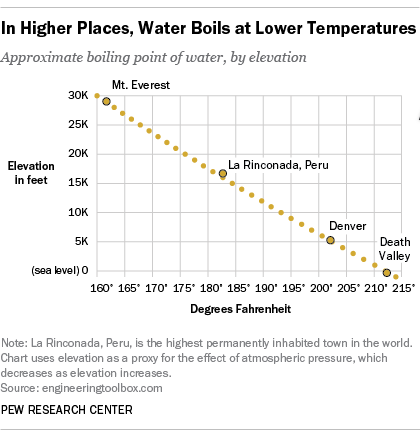You might already know that the inside of a vehicle can get extremely hot—much hotter than the air temperature outside. That’s why police often break a car window if a child or pet is left inside, even if it's "only" 90 degrees Fahrenheit outside. It’s a good idea for every driver to keep some emergency supplies in their car. But here's a question: should you worry about your stored water boiling in the summer heat? Summary: The boiling point of water changes based on atmospheric pressure. For every 500 feet you go up in elevation, the boiling point drops by about 1°F. This means that at high altitudes, water boils at a lower temperature. At sea level, water boils at 212°F, but on Mount Everest, it can boil as low as 160°F. However, even though the boiling point is lower, the ambient temperature at such heights is also much colder. So, in practice, it’s still unlikely for water to boil in a typical car. There’s an easy experiment to demonstrate this: take a syringe filled with warm water, remove the air, and pull the plunger to reduce pressure. The water will begin to boil at a much lower temperature than 212°F. In one video, a person boiled water at just 82°C (179.6°F). With a vacuum pump, water can even boil at room temperature. So while elevation affects boiling points, it doesn't really apply when considering water in a car. Even in places with lower boiling points, the temperatures aren't high enough to make water boil naturally. A study from Arizona State University found that cars parked in the sun can reach internal temperatures over 150°F. On a 92°F day, I placed a thermometer in my car's trunk and saw it rise to 100°F. When moved to the shaded driver’s seat, it climbed to 110°F within five minutes. Placing it on the dashboard, the temperature quickly exceeded 120°F, which was the limit of my thermometer. This shows that the dashboard is the hottest part of the car, followed by the seats and steering wheel. The trunk, being more insulated, stays cooler. Another example comes from W&W Auto Detailing in Arizona, where they measured 207°F on the roof of a black Camaro on a 120°F day. The inside of the car reached around 180°F, which is still far below the boiling point of water. Even in a place like Denver, where the boiling point is slightly lower due to elevation, the highest recorded temperature is only 100°F. So unless we see extreme climate shifts, water in a car won’t boil. Many people confuse ambient temperature with surface temperature. In reality, surfaces like dashboards, seats, and wheels can be much hotter than the air inside the car. For instance, in a study, the dashboard was consistently hotter than the surrounding air, though not by a huge margin. Surface temperatures can lag behind ambient temperatures. Think of a dishwasher: it needs to reach 180°F to properly sanitize dishes, even though the water inside is only heated to 160°F. Sunlight plays a major role in raising surface temperatures, making them significantly hotter than the air itself. So, while the air inside a car might feel hot, the actual surfaces can be dangerously hot—especially if exposed to direct sunlight for long periods. Clear, disposable water bottles are not safe to leave in a hot car. They can act like magnifying glasses in direct sunlight, potentially causing fires. Also, heat can cause harmful chemicals to leach into the water, especially from plastics. While this isn’t ideal, it’s better than dehydration in an emergency. Alcohol, including hand sanitizer and rubbing alcohol, has a much lower boiling point than water—around 132.8°F (56°C). If left in a hot car, it could evaporate or even cause containers to burst. This isn’t a major safety hazard, but it could create a mess and reduce the effectiveness of your hand sanitizer. In short, while water in your car won’t boil, other things might. Always store sensitive items carefully, and remember—never leave kids or pets in a hot car. Sunshade Window Roller Curtain Sunshade Window Roller Curtain,Sun Shade Roll Up Blinds,Sun Shade Roller Blinds Outdoor,Window Roller Curtain Sunshade Hebei Charlotte Enterprise Co., Ltd. , https://www.hbcharlotteawning.com
Elevation Affects Boiling Points, But Not in This Case
How Hot Does a Car Get?
Ambient vs. Surface Temperature
Don’t Leave Clear Water Bottles or Alcohol in Your Car
